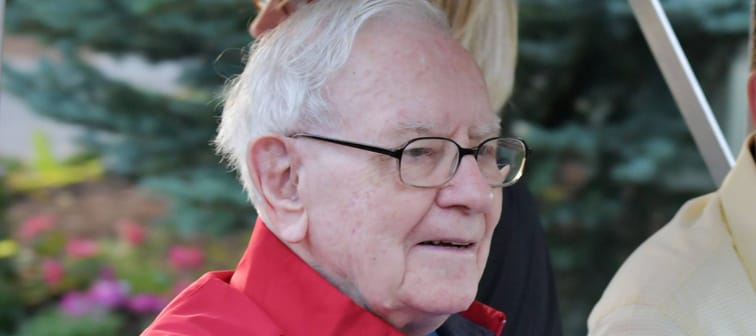1. He lives in the same home he bought back in 1958
While most billionaires bulk up on expensive real estate, Buffett originally paid US$31,500 for his Omaha, NB, home — that’s about USD$336,164 in today’s dollars — and he’s lived there for over 60 years.
His home is by no means tiny, however. The 6,570-sq.-ft., five-bedroom house has had plenty of renovations and additions over the decades and is worth about USD$1.44 million today. It’s also protected by fences and security cameras and most likely has a good homeowners insurance policy, as well.
Buffett has no plans to move out, calling the house “the third best investment I ever made,” in a 2010 letter to Berkshire Hathaway’s shareholders.
A better online investing experience
Easy to use and powerful, Qtrade's online trading platform puts you in full control with tools and resources that help you make well-informed decisions.
Invest Now2. He rarely takes out loans
Buffett’s one-and-only mortgage was on a vacation home in Laguna Beach, CA, that he purchased in 1971, although he certainly had the cash to afford the USD$150,000-listed seaside property.
He told CNBC that he took out the 30-year mortgage loan because “I thought I could probably do better with the money than have it be an all-equity purchase of the house.” He took that extra money and invested it in more shares of Berkshire Hathaway — the company that eventually brought him billions.
His strategy of not locking up all his money in a single asset still holds true today. For current homeowners, as interest rates finally begin to drop, it may be worth considering refinancing especially if you want to free up some of your home equity. A switch may save you thousands of dollars a year.
3. He buys breakfast cheap
While Buffett could simply have a personal chef cook him a gourmet breakfast, he often grabs Mickey D’s on his way to work. He says he doesn’t like to spend more than $3.17 on his morning meal.
“When I’m not feeling quite so prosperous, I might go with the $2.61, which is two sausage patties, and then I put them together and pour myself a Coke,” he says in HBO's 2017 documentary Becoming Warren Buffett. He continues: “$3.17 is a bacon, egg and cheese biscuit, but the market’s down this morning, so I’ll pass up the $3.17 and go with the $2.95.”
Instead of going out for meals or buying a latte from Starbucks every day, make your own lunches and coffee. You can also get a little extra money by signing up for a cash-back app, such as Moka, that gives you actual cash back, not points, on your purchases.
Unexpected vet bills don’t have to break the bank
Life with pets is unpredictable, but there are ways to prepare for the unexpected.
Fetch Insurance offers coverage for treatment of accidents, illnesses, prescriptions drugs, emergency care and more.
Plus, their optional wellness plan covers things like routine vet trips, grooming and training costs, if you want to give your pet the all-star treatment while you protect your bank account.
Get A Quote4. He buys marked-down cars
While many wealthy individuals maintain collections of luxury sports cars and vintage models, Warren Buffett reportedly opts for cars that are used and are thus available at lower prices
He upgraded from his 2006 Cadillac DTS to a Cadillac XTS for just USD$45,000 in 2014. "The truth is, I only drive about 3,500 miles a year, so I will buy a new car very infrequently,” he told Forbes.
Whether you opt for a brand-new car or a slightly used model, emulate Buffett by spending within your limit. That means you won’t want to go for the first loan you spot and should look around for better deals. A good habit is to do a quick check of auto insurance rates every six months.
5. He doesn’t splurge on brands
Buffett doesn’t much care for designer suits or the latest iPhone model — he relied on his $20 flip-phone for years before swapping it out for the Apple smartphone in 2020.
Buffett avoids unnecessary spending and once said, “Do not save what is left after spending, but spend what is left after saving.”
Park your funds in a high-yield savings account or in a diversified investing portfolio so the money can grow over time. Set aside your extra cash for an emergency fund or retirement instead of blowing it all on nonessential purchases.
6. He doesn’t invest with borrowed money (anymore)
“I’ve never borrowed a significant amount of money in my life. Never. Never will. I’ve got no interest in it,” he told students at Notre Dame in 1991.
Although a young Buffett once borrowed 25% of his net wealth to buy shares, he warns investors against repeating the same mistake.
Even skilled stock traders will tell you borrowing to invest can be risky. And there’s no real need with investing apps that allow you to start with a small amount of money, such as Wealthsimple, which lets you invest using nothing more than your spare change.
7. He does what he loves
Buffett credits some of his success to his passion for investing. “You have to love something to do well at it,” he says, urging people to take the jobs they love, instead of positions that look good on your resume.
Even if you can’t quit your full-time job to focus on the things you truly enjoy, you can certainly find the time for some affordable hobbies. Buffett himself enjoys card games and playing the ukulele.
And, if you’re looking for a way to boost your income, capitalize on your skills and hobbies, try setting up a side hustle, such as being a mystery shopper.
8. He finds creative ways to save
When Buffett’s first child was born, he converted a dresser drawer into a bassinet. For his second, he borrowed a crib.
“If you buy things you don’t need, you will soon sell things you need,” the billionaire says.
Carefully examine your finances to identify areas where you can reduce spending. While no one likes to admit it, we all have areas where we overspend. Consider getting a library card to borrow books and movies instead of buying them or using a streaming service. Read a few thoughtful advice columns on saving money.
9. He uses cash, not credit
While most of us prefer the convenience of a credit card for our everyday purchases, Buffett goes old-school and uses hard cash.
He told Yahoo! Finance Editor-in-Chief Andy Serwer in 2019 that he uses cash “98% of the time. If I’m in a restaurant, I’ll always pay cash. It’s just easier.” While the method may sound a bit old school, relying less on your credit card can help prevent spending money you don’t have.
Using most of your available credit and falling behind on your monthly payments not only leads to debt but also damages your credit score. If you’re struggling to pay off your credit card debt, you might want to consider bundling it up into a debt consolidation loan with a lower interest rate.
10. He use coupons to save big
Warren Buffett is known to use coupons, even when dining out with rich friends. This habit highlights how saving money on everyday purchases is valuable, regardless of how rich you are. While it can be tempting to spend big, especially in front of others, don’t let the need to impress lead you into debt.
11. He tracks his expenses
Buffett reportedly keeps careful track of his expenses, highlighting the importance of knowing where your money goes. Tracking your expenses is key to identifying areas where you can cut back and helps ensure you stick to a budget.
12. He invests in quality over quantity
Buffett believes in buying quality items that last for more years rather than cheaper alternatives that require frequent replacement. This principle applies to everything from clothing to appliances, ultimately saving money in the long run.
With files from Sandra MacGregor
Sources
1. Yahoo! Finance: Warren Buffett carries an American Express card and about $400 in cash (May 1, 2019)
Sponsored
Trade Smarter, Today
Build your own investment portfolio with the CIBC Investor's Edge online and mobile trading platform and enjoy low commissions. Get up to $100 in commission-free options until October 31, 2024.







